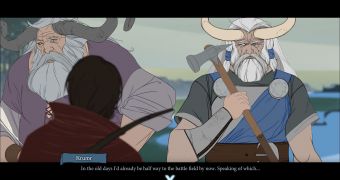One of the first decisions I came to regret in The Banner Saga involves a Varl, bigger than a human and horned, and his attempt to stop a cart loaded with goods from sliding into a deep crevasse.
I read the text of the situation and wondered what I should do before deciding that the creature, with help from the other members of our caravan, could pull it all back to safety, mainly because the game had been feeding me info about the power of the race that humans had a strained relationship with.
I was wrong about the situation and the Varl failed to stop the cart and went over the edge with it.
I now had one less powerful fighter for my group and I felt a pang of regret when other characters talked about their fallen comrade.
This is perhaps the smallest of the losses that a dedicated player will suffer in The Banner Saga, a game that manages to blend hope, almost irrational in nature, with disappointment, almost theatrical.
The game might feel slow and ponderous to some players, but I like the fact that all information is given out in short bursts and it’s hard to fully understand the actions of major characters at first.
Both the humans and the Varl come off as essentially flawed, creatures who act based on prejudice or on long held custom rather than using their intelligence to figure out what’s the solution to a situation.
I advise all those who play The Banner Saga to try and stay as unattached as possible to the protagonists, because they have a tendency to die or, even worse, behave in ways that make them less heroic.
The Stoic-made game might never create a full universe, but it manages to build a world I really cared about.

 14 DAY TRIAL //
14 DAY TRIAL //